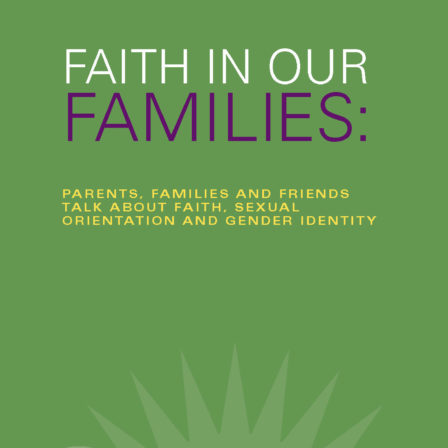Faith is an important and positive part of the lives of many Portlanders, and in the lives of many PFLAG members. Many religious institutions in the Portland Metro Area welcome and affirm LGBTQ members into their congregations. The Community of Welcoming Congregations is an excellent place to get deeper answers to your questions about faith and being LGBTQ.
How can I reconcile being LGBTQ with my faith?
Faith is a very personal issue. Coming out as LGBTQ, or supporting a loved one that is, can be a challenge if you feel it is at odds with your religious community’s teachings. Being LGBTQ does not impact a person’s ability to be moral and spiritual any more than being straight does. Many LGBTQ people are religious and active in their own faith communities. It is up to you to explore, question and make choices in order to reconcile your personal faith with your religious community’s attitudes towards homosexuality and gender identity. For some this means working for change within their faith community, and for others it means leaving it.
Are there other people of faith out there who are LGBTQ or who have LGBTQ loved ones?
Yes! You will find LGBTQ people or their loved ones in almost every faith group across the country. Many LGBTQ people, their friends, and their families remain in their faith communities after coming out and continue to worship as they did before.
There are a growing number of faith organizations that do positive work for the LGBTQ community. In addition to worship services a number of organizations offer resources specific to their faith work.
Are religious attitudes toward sexual orientation and gender identity changing?
Yes, rapidly and for the better. Many mainstream American religions have now taken official stands in support of LGBTQ rights. Since 1991, the United Church of Christ has had a denominational policy stating that sexual orientation should not be a barrier to ordination. In the Episcopal Church, the denomination’s legislative body has declared that gay people have a full and equal claim with all other people upon the church and have ordained openly gay clergy. Religious attitudes toward sexual orientation and gender identity are constantly evolving.
What does scripture say about sexual orientation and gender identity?
Many PFLAG members approach the issue of religion and being LGBTQ by analyzing religious texts. They seek to find answers in the Bible, Koran, Torah and elsewhere. There are however many interpretations of any text. PFLAG encourages you to explore different interpretations of scripture. Widely respected biblical scholars disagree about the interpretations of the scripture. Passages about sexual orientation and gender identity are no exception.
How do I tell my faith community?
You should first explore your faith community’s attitudes about LGBTQ people. Depending on your faith community’s teaching and leadership, they may or may not be in a position to give you support. A strong support system outside your faith community (PFLAG, supportive friends and family, etc.) can be helpful or necessary.
Can LGBTQ people change?
No – and efforts to do so aren’t just unnecessary – they’re damaging.
Religious and secular organizations do sponsor campaigns and studies claiming that LGBTQ people can change their sexual orientation or gender identity. These studies and campaigns are based on ideological biases and not peer-reviewed solid science. No studies show proven long-term changes in gay or transgender people, and many reported changes are based solely on behavior and not a person’s actual self-identity. The American Psychological Association has stated that scientific evidence shows that reparative therapy (therapy which claims to change LGBTQ people) does not work and that it can do more harm than good.
PFLAG believes that it is our anti-LGBTQ attitudes, laws and policies that need to change, not our LGBTQ loved ones.
Discovering that a loved one is gay, lesbian, bisexual or transgender can pose new questions about your faith and may prompt you to re-evaluate beliefs that you previously took for granted. By using personal experiences, this publication provides examples for reconciling your faith with the knowledge that a loved one is gay. This publication includes an updated list of gay and lesbian religious and spiritual groups to watch out for.

